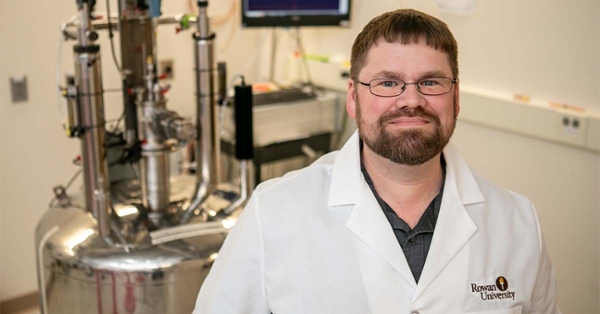Rowan professor earns Fulbright to study nanoparticles abroad
Rowan professor earns Fulbright to study nanoparticles abroad

A Rowan University scientist will spend the spring 2026 semester in Seoul, South Korea, with support from the Fulbright U.S. Scholar award program.
Nicholas Whiting, an associate professor in the College of Science & Mathematics with joint appointments in the Department of Physics & Astronomy and the Department of Biological & Biomedical Sciences, will be based at Hanyang University’s Department of Chemical and Molecular Engineering. He will collaborate with a research group studying silicon-based nanoparticles for use as quantum sensors.
Established by Congress in 1946, the Fulbright Program is the federal government’s flagship educational and cultural exchange initiative. Each year, about 8,000 accomplished students, artists, teachers, professionals and scholars at all levels from more than 160 countries earn opportunities to study, teach, conduct research, exchange ideas and contribute to finding solutions.
“Once upon a time, a long time ago, you could be a scientist and sit in a lab and make sufficient progress,” said Whiting, who holds a Ph.D. in physical chemistry. “In order to do new things, you need to combine expertise. It’s really hard to do something novel just on your own anymore. It takes a village—you need to combine expertise, techniques and capabilities.”
Named a National Science Foundation CAREER Award winner in 2023, Whiting has long pursued opportunities to engage in science on an international scale. As a graduate student, he attended the weeklong Lindau Nobel Laureate Meeting in Germany, which that year focused on the fields of physiology and medicine. As a postdoc associate, he spent nearly two years at the University of Nottingham in the U.K., where he studied magnetic resonance.
In his lab at Rowan, Whiting applies physics and chemistry to improve biomedical imaging— making it better, faster and more affordable. In South Korea, he will explore a new area of collaborative research aimed at advancing medical imaging and quantum computation. He expects the trip will further strengthen a longstanding relationship with the Hanyang lab, which previously shared nanoparticles for use in his undergraduate research projects.
“I’ll be serving as a visiting scholar and acting as a cultural ambassador,” Whiting said. “I’ll be bringing back what I learn so I can share it with the Rowan community.”